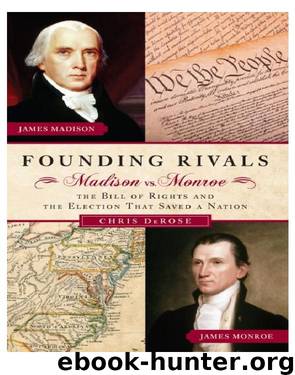Founding Rivals by Chris DeRose

Author:Chris DeRose
Language: eng
Format: epub
Publisher: Regnery Publishing
Published: 2011-10-17T16:00:00+00:00
State: Total population: Slave population:
Virginia (includes Kentucky) 821,287 305,057
Massachusetts (includes Maine) 475,327 None
Pennsylvania 434,373 3,737
New York (includes Vermont) 425,659 21,324
North Carolina 393,751 100,572
Maryland 319,728 103,036
South Carolina 249,073 107,094
Connecticut 237,946 2,764
New Jersey 184,139 11,423
New Hampshire 141,885 158
Georgia 82,548 29,264
Rhode Island 68,825 948
Delaware 59,094 8,887
Virginia had almost fourteen times the population of Delaware, and yet both states had the same power in the Confederation Congress.e Madison fought hard for representation based on population in the Senate as well as the House. He could never be convinced, he said, that the present equality among the states in Congress was just, “nor necessary for the safety of the small states against the large states.” He pointed to concessions by Paterson himself and another member of the New Jersey delegation on this very issue.
Madison did not believe the largest states would ever pose a threat to the smaller ones. There were significant economic, religious, and cultural differences among Virginia, Pennsylvania, and Massachusetts; and the history of the Confederation demonstrated that they were not typically prone to vote together. But Madison’s logic could not convince the small states to give up their disproportionate power. The problem seemed intractable.
It was then that Franklin rose to speak, noting the “small progress we have made after four or five weeks,” the “different sentiments on almost every question,” and the high number of dissenting states on recent votes. Franklin went on, “We have gone back to ancient history for models of government, examined the different forms of those republics which having been formed with the seeds of their own dissolution no longer exist. And we have viewed modern states all round Europe, but find none of their Constitutions suitable to our circumstances.”
Considering the impasse the delegates had reached, Franklin wanted to know why they had not appealed to God. He asked why the delegates had not “once thought of humbly applying to the Father of lights to illuminate our understandings?” He continued,In the beginning of the contest with Great Britain, when we were sensible of danger we had daily prayer in this room for the divine protection. Our prayers, Sir, were heard, and they were graciously answered. All of us who were engaged in the struggle must have observed frequent instances of a superintending providence in our favor. To that kind providence we owe this happy opportunity of consulting in peace on the means of establishing our future national felicity. And have we now forgotten that powerful friend? Or do we imagine that we no longer need his assistance?
I have lived, Sir, a long time, and the longer I live, the more convincing proofs I see of this truth—that God governs in the affairs of men. And if a sparrow cannot fall to the ground without his notice, is it probable that an empire can rise without his aid?
Download
This site does not store any files on its server. We only index and link to content provided by other sites. Please contact the content providers to delete copyright contents if any and email us, we'll remove relevant links or contents immediately.
| African Americans | Civil War |
| Colonial Period | Immigrants |
| Revolution & Founding | State & Local |
Cat's cradle by Kurt Vonnegut(13868)
Pimp by Iceberg Slim(12931)
Underground: A Human History of the Worlds Beneath Our Feet by Will Hunt(11257)
4 3 2 1: A Novel by Paul Auster(11050)
The Radium Girls by Kate Moore(10907)
American History Stories, Volume III (Yesterday's Classics) by Pratt Mara L(4826)
Perfect Rhythm by Jae(4621)
Wiseguy by Nicholas Pileggi(4586)
The Fire Next Time by James Baldwin(4343)
Paper Towns by Green John(4169)
A Higher Loyalty: Truth, Lies, and Leadership by James Comey(4033)
Pale Blue Dot by Carl Sagan(4001)
The Mayflower and the Pilgrims' New World by Nathaniel Philbrick(3914)
The Doomsday Machine by Daniel Ellsberg(3731)
Too Much and Not the Mood by Durga Chew-Bose(3694)
Killers of the Flower Moon: The Osage Murders and the Birth of the FBI by David Grann(3609)
The Borden Murders by Sarah Miller(3590)
The Sympathizer by Viet Thanh Nguyen(3481)
Killing England by Bill O'Reilly(3455)
